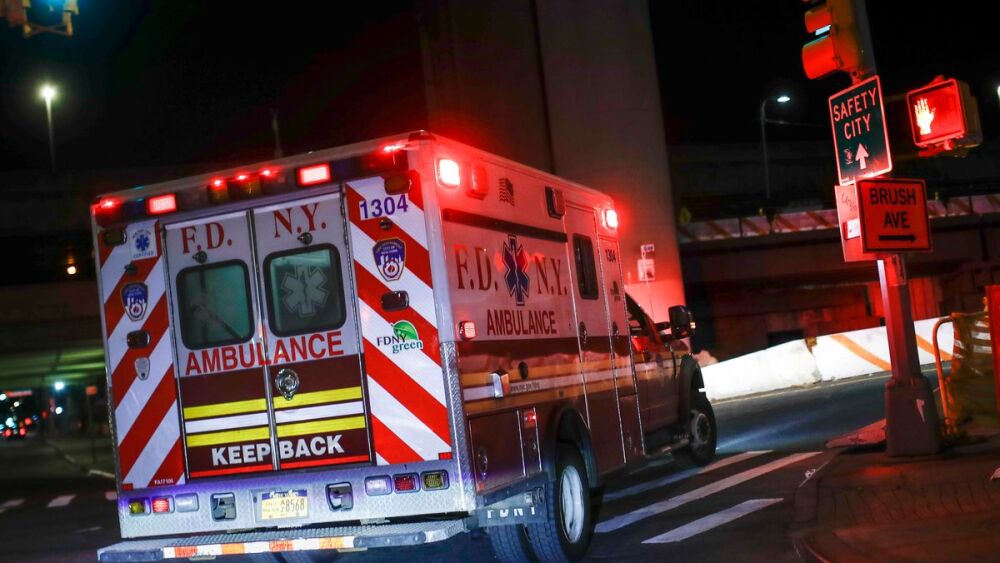By the time Vickie Potochniak-Weiner was a teenager in upstate New York, she was quite familiar with emergent care – from a patient’s perspective. “I’d had asthma as a kid and was in the hospital all the time,” the West Endicott native says. “I guess that’s why I started thinking about a medical career.”
Potochniak-Weiner signed up for a Red Cross advanced first-aid course at 13 – too young to be certified in anything except audacity. “I got 90-something on our final exam. When I handed it in, the proctor asked for some ID. I told him I didn’t have any. I had to wait two years and take the course again.”
After passing her test for the second time, she was recruited by the Vestal (New York) Volunteer Emergency Squad. There was only one problem: At 15, she still wasn’t old enough to drive – not something she’d mentioned during her interview. “They let me stay, but told me to keep quiet about my age until I turned 16.”
Bad day, big decision
One of Vickie’s first calls was hard to forget. “It was a two-year-old in a swimming pool,” she says. “There was no easy way to get there; it was about 25 minutes away.”
“The little girl was in cardiac arrest. We did CPR all the way to the hospital, but she was pronounced right away. Remember, I was only 15; I’d never seen an adult die, let alone a two-year-old.
“You know how a rig looks after an arrest; well, I was in there trying to tidy things up, and I’m bawling. I tried to hide so no one would see what a weenie I was. Then this guy came running up to the back of the ambulance, carrying this limp little boy. He told me his son had fallen two stories out a window at their house. So I grabbed the kid and brought him into the ER.”
Vickie was told to get ready for a transfer to the one trauma center in the Binghamton area. “Then I really had to get the rig squared away, so I’m cleaning it up and trying not to cry, when this big, hulking guy on our crew, John, climbed in back. He saw me holding back tears, gave me a bear hug and said, ‘Look, this afternoon sucks, but we have to get it together. It’ll be OK – I’ll be right here with you.’ Then we took the kid to the trauma center.” He died two days later.
“After the call, I told John I’m not cut out for EMS and I’m never doing it again. He tried reassuring me, but he could tell how upset I was. When we got back, he called my mother and explained what had happened. He also signed me up for a shift the next morning and promised Mom he’d stay with me.”
Staying with Vickie is what John Potochniak did for the next 27 years – two as her friend and mentor, two as her fiancée, and the final 23 as her husband. They continued to volunteer at Vestal, raised three children – Stephen, Courtney and Matthew – and attended nursing school together in the mid ’80s while working full time as aides at the local hospital. “Whichever of us was the most awake would go to the first couple of classes and take notes while the other one slept in the car,” explains Vickie. “Then we’d switch.”
RN, EMT, Etc.
Even as RNs, the Potochniaks stayed passionate about EMS. Vickie, an EMT since age 18, challenged the paramedic program at Broome Community College after earning her nursing degree, then went to work for Superior Ambulance Service as a new medic – a job she still does part time. In 1996, she enrolled at King’s College to become a physician assistant.
“If you’re a paramedic who wants to become a PA, you probably have way more knowledge than some of your instructors,” says Potochniak-Weiner, who has specialized in emergency medicine as a nurse, paramedic and PA for 35 years. “But it’s not a simple process. You have to be patient. Some of the things you’ll learn aren’t exactly what happens in the real world. Still, you have to be able to spit them back on tests.
“All of your paramedic skills will be invaluable when you’re done with school. You’ll be miles ahead of your non-medic colleagues with the hands-on skills. Even better, I think there’s a huge untapped market for putting PAs with EMS experience in fly cars. We could use knowledgeable people with advanced training to handle non-emergent calls that bog down the system.”
“Grief is also a journey”
On Mar. 26, 2006, Vickie returned home from church to a horrific scene: John was in cardiac arrest. “The kids were doing CPR on him, but he was gone,” she says. “That was the start of a very difficult time for us.”
“My youngest, Matthew, was 13. He didn’t take it too well. He was very angry. He said, ‘Mom, you save all those people at work, why couldn’t you save Dad?’ How do you answer that?
“I took six months off from medicine, but all during that time, people from the ER and the squad helped keep me afloat. They were like family.”
Vickie was especially close to two Vestal volunteers, Bob Weiner and his mother, Marilyn. Sometimes they’d ride together. Marilyn reminded her son that Vickie was still single seven years after John died. When Bob asked her out, Vickie said yes – reluctantly.
“I wasn’t sure I was ready for dating,” she recalls. “Losing John was terribly hard for a long time, but I learned grief is also a journey. After pain and sadness and anger comes the remembrance of good times; then, finally, acceptance. Grief finds its place and is no longer all-consuming.”
Vickie and Bob dated for a year, then got married. “Now we share five kids, including a Steven to go along with Stephen,” says Vickie. “And if you don’t mind a proud mom boasting, both of them have out-of-hospital cardiac-arrest saves.”
As for Vickie’s own prehospital efforts, she realizes she’s in the autumn of an EMS career that began 40 years ago. “I start feeling old after giving my third Narcan in a shift or carrying a patient down two flights of stairs,” she says. “At some point, I wouldn’t mind moving from the ambulance to the classroom.”
Imagine what she could teach.
Read next: EMS Pioneers: Three Champs



